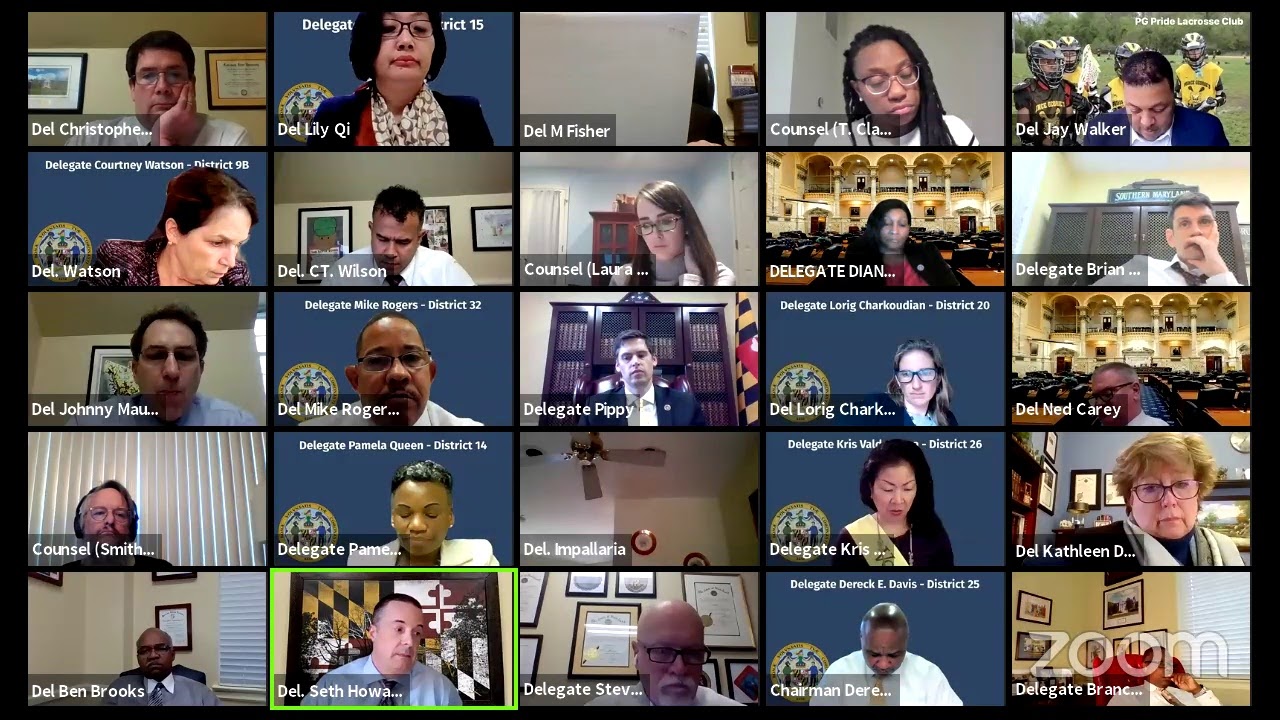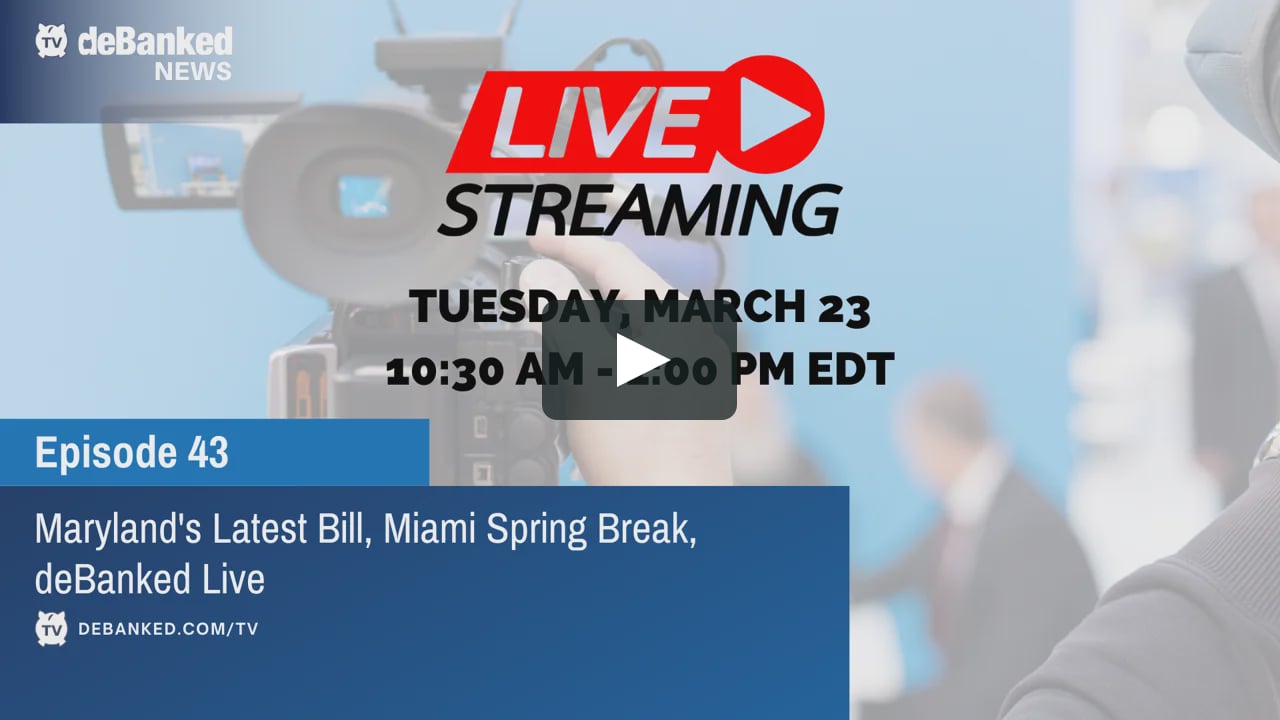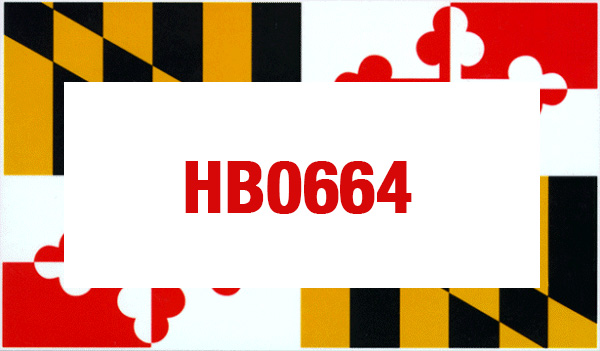Related Headlines
| 11/17/2023 | Maryland sets unemployment record |
| 03/14/2022 | Maryland points to NY and CA on disclosure |
| 03/22/2021 | Steve Denis on why Maryland MCA bill failed |
| 02/21/2020 | Maryland seeks prohibition... of MCAs |
Related Videos
Maryland MCA Prohibition Bill Fails - 2021 | Ep 43 - deBanked TV, Miami, Maryland |
Maryland MCA Prohibition Bill - Senate Hearing | Maryland MCA Prohibition Bill - House Hearing |
Stories
Maryland’s Commercial Financing Disclosure Bill Failed to Move Forward
April 12, 2022 Maryland’s commercial financing bill, propelled by bi-partisan support, failed to overcome the final hurdle before the State’s 2022 legislative session adjourned sine die yesterday. SB 825 passed the Senate in March and became the subject of much debate in the House of Delegates on the 30th. Testimony from 17 people was considered, much of it oral.
Maryland’s commercial financing bill, propelled by bi-partisan support, failed to overcome the final hurdle before the State’s 2022 legislative session adjourned sine die yesterday. SB 825 passed the Senate in March and became the subject of much debate in the House of Delegates on the 30th. Testimony from 17 people was considered, much of it oral.
The bill’s lofty idyllic intent is perhaps what contributed to its demise. Despite legislative enthusiasm for applying consumer style protections to commercial finance transactions, regulators tasked with its actual implementation were amongst its harshest critics.
The Consumer Protection Division of the State’s Attorney General’s Office said “the bill makes a violation an unfair, abusive or deceptive practice in violation of the Consumer Protection Act. With limited exceptions, violations of the Consumer Protection Act are limited to consumer transactions, i.e., transactions that are primarily for personal, family or household use, and expanding the CPA to cover business-to business transactions would open a door that could lead to a significant increase in the number of complaints received by the Division, requiring the Division to add corresponding resources.” The Division gave an official thumbs down on the bill.
Maryland’s Department of Labor stated that the requirements of the bill would make it “difficult to operationalize from a monitoring, investigatory and enforcement perspective” and that there would be too much uncertainty given that New York, a state that passed a similar law, has been unable to effectively implement their own version. “Maryland small businesses, lenders and borrowers alike, may be negatively impacted if the rollout of the system in New York is significantly delayed or New York enacts systems or procedures not appropriate to or anticipated by Maryland businesses,” it concluded.
Other states, like California, have encountered similar problems with commercial financing disclosure legislation. The bill it passed in 2018 still has not been implemented over lingering disputes over how to do the math it mandates.
Proponents and critics alike picked away at each other’s arguments in Maryland, but when the session ended late late Monday evening to a hail of confetti and balloons, SB 825 had not been called. This was the third year in a row that a commercial financing bill has failed. Another version will likely be introduced when the legislature eventually returns.
Update on Maryland Commercial Financing Bill
March 20, 2022Maryland’s commercial financing disclosure bill is continuing to move through the state legislature. After debate with potentially affected parties, some changes were made to the bill’s language. The APR requirement on sales-based financing transactions remains in the bill, however.
The bill passed through the Senate unanimously (47-0) and has been referred to the House. The original version in the House had been withdrawn but that was most likely because the members of that chamber anticipated that substantive edits would take place in the Senate. The House will now resume review and consideration of the Senate’s version going forward.
Initiative to Push Maryland Commercial Financing Disclosure Bill Points to New York and California
March 14, 2022 Maryland State Senate bill SB0825 was put up for contentious debate last week. The bill is Maryland’s latest attempt to impose restrictions on a subset of commercial finance transactions.
Maryland State Senate bill SB0825 was put up for contentious debate last week. The bill is Maryland’s latest attempt to impose restrictions on a subset of commercial finance transactions.
State Senator Ben Kramer spoke at length before the Finance Committee, arguing that opposition to the 2022 version of the bill would be fruitless because it was modeled after passed legislation in New York and California. Apparently operating under the impression that such states had settled the issue of calculating an APR on a purchase transaction, Kramer appeared unaware (perhaps intentionally) that both states have been unable to enact their legislations because of critical flaws in their mathematical assumptions. In the case of California, for example, implementation of its disclosure law has been delayed for almost 4 years.
The corresponding Maryland House Bill of this legislation (HB1211) has since been withdrawn.
Senator Kramer has led the push for regulation for three years straight, beginning in 2020 when a related bill he introduced was called “Merchant Cash Advance Prohibition.”
Steve Denis, SBFA on Why Maryland MCA Bill Failed
March 22, 2021 “In a lot of these places, a lot of the bills are well intended, believe it or not,” Steve Denis, executive director of the Small Business Finance Association, said. “Legislators just don’t understand enough about our industry to understand the nuances. We’ve worked really hard educating policymakers in Maryland, and frankly, they now understand our industry better.”
“In a lot of these places, a lot of the bills are well intended, believe it or not,” Steve Denis, executive director of the Small Business Finance Association, said. “Legislators just don’t understand enough about our industry to understand the nuances. We’ve worked really hard educating policymakers in Maryland, and frankly, they now understand our industry better.”
Denis was referring to the nearly unanimous canning of Maryland’s MCA “Prohibition” bill last week. The bill failed to get enough support to leave the committee, blocked by a 19 to 3 vote against bringing the law out to the House floor. Denis, a proponent of the MCA and alt financing industry for years, said it was due to legislators understanding the need for capital “out there during the pandemic” and how harmful an APR cap could be for both business owners and the broker industry.
The law was originally proposed last year before covid shutdowns, but that also failed to make it to the floor. It now appears to be an annual event.
“Our goal as an organization is to make sure that small businesses have access to all different types of financial products and that we believe that small businesses are in the best position to make good decisions for their businesses,” Denis said. “The bill in Maryland narrowly targeted MCA products, and as you know and a lot of folks in the industry know, that sometimes MCA is in the best interest of the business, there’s a lot of benefits to an MCA.”
Denis punctuated his statement with the mantra- we were not out of the woods yet. An APR disclosure bill was just introduced in the Connecticut State Senate last month, modeled off the New York APR bill set to go into effect this year. Denis was hopeful the legislators could learn from speaking to industry interests and change their course like in Maryland.
“We are engaged, I think we’re in a good spot. With any of these bills, Maryland, Connecticut, I caution you know we’re not out of the woods yet,” Denis said. “We still want to work really closely with policymakers. We’re for meaningful disclosure, we think there needs to be some guardrails on our industry, but I think that the most important thing we can do is continue to educate folks in states.”
Maryland’s Latest Merchant Cash Advance Prohibition Bill Failed to Advance
March 18, 2021 Despite the rapid advancement of the newest merchant cash advance prohibition bill in the Maryland state legislature, the bill failed to jump over the final hurdle in a House Committee hearing on Thursday. Delegate Seth Howard (R), who introduced the bill, vigorously advocated for it to move forward so that it could proceed to the Floor, going so far as to say he was willing to make some concessions to at least get “the regulatory structure” of the bill into law.
Despite the rapid advancement of the newest merchant cash advance prohibition bill in the Maryland state legislature, the bill failed to jump over the final hurdle in a House Committee hearing on Thursday. Delegate Seth Howard (R), who introduced the bill, vigorously advocated for it to move forward so that it could proceed to the Floor, going so far as to say he was willing to make some concessions to at least get “the regulatory structure” of the bill into law.
“I don’t want to snatch defeat from the jaws of victory,” he maintained.
There were several amendments up for consideration, including the inclusion or removal of a 24% APR rate cap on MCA transactions. The subject of APR dominated the light Q&A that took place, but one delegate voiced concern that creating restrictions on capital providers to businesses that might not be able to obtain funding elsewhere would probably be counterproductive. And when a roll call of votes was taken to determine if the Bill should advance to the Floor, he voted no, as did nineteen of his colleagues. Only three voted yes, so the bill did not advance, ending its prospects for the 2021 legislative session. However, it could be reintroduced again in 2022.
Committee Vice-Chair Kathleen Dumais (D) said that she thought the bill “was not ready” despite Delegate Howard “having worked hard on it.” This was Howard’s second try in two years to move it forward. His first attempt, introduced on February 7, 2020, was called the Merchant Cash Advance Prohibition Bill. The more recent one dropped the “prohibition” label but used language that would have effectively prohibited them in the state of Maryland.
Maryland MCA Prohibition Bill Morphs Into MCA APR Limit, Broker Licensing, Double Dipping, Uniform Disclosure, and Go to Jail Bill
February 18, 2021Update: A Recording of the Hearing is Here
 Plans to enact “prohibition” in Maryland on merchant cash advance transactions abruptly came to a halt last year, but the legislature there has brought the issue back front and center in 2021, designing a system of prohibition while dropping the actual word from the name.
Plans to enact “prohibition” in Maryland on merchant cash advance transactions abruptly came to a halt last year, but the legislature there has brought the issue back front and center in 2021, designing a system of prohibition while dropping the actual word from the name.
No MCA transacted in the state would be permitted to have an estimated APR that exceeds 24%, for example. The penalty for violating such a statute can be imprisonment for up to 3 years.
Newly introduced House Bill 664 (SB0532) would “prohibit a person from engaging in the business of making or soliciting a sales-based financing transaction unless the person is licensed by the Commissioner of Financial Regulation” and would require that an applicant “for a license having $20,000 in available liquid assets and to have demonstrated a sufficient level of responsibility to command public confidence and warrant faith in the honest operation of the business.”
The 26-page bill includes a laundry list of requirements and restrictions like specific disclosures, how to calculate a forward-looking estimated APR on an MCA, and a limitation of 24% on that APR.
The bill draws heavily from the recently passed law in New York, going so far as to copy and paste the section requiring MCA funders to disclose if there is literally any “double dipping” in the contract.
The Commissioner of Financial Regulation would retain sole authority to judge compliance with the law.
A House committee hearing on the bill was conducted yesterday and a subsequent one in the Senate is scheduled for February 23rd at 1pm.
You can read the full version of the Maryland House Bill here.
Maryland Merchant Cash Advance Prohibition Bill Put on Hold After State Abruptly Ended The Legislative Session
March 19, 2020 The State of Maryland decided to end their 2020 legislative session late last night rather than on the original April 6th deadline, due to COVID-19 concerns. Legislators managed to pass 650 bills in a “3-day sprint” but did not get to everything. Among the bills that did not even make it to the floor were SB913 and HB1478, the bills that called for an outright prohibition on a narrow definition of merchant cash advances.
The State of Maryland decided to end their 2020 legislative session late last night rather than on the original April 6th deadline, due to COVID-19 concerns. Legislators managed to pass 650 bills in a “3-day sprint” but did not get to everything. Among the bills that did not even make it to the floor were SB913 and HB1478, the bills that called for an outright prohibition on a narrow definition of merchant cash advances.
But it’s not over. Legislative leaders plan to hold a special legislative session at the end of May which they may use to vote on the numerous bills they were not able to pass in time this week.
Senate President Bill Ferguson told the Baltimore Sun, “We want to give enough time for the public health crisis to move past.”
The bills were not exactly on the fast track as it was, having only gone through 1 committee hearing leading up to the deadline.
If the bills do not pass during the special legislative session in May, they might not be picked up again until the normal session resumes in Mid-January 2021.
Maryland Legislative Committee to Meet On Merchant Cash Advance Prohibition (Rescheduled to Wednesday)
March 2, 2020Legislators in the Maryland State House will meet today on Wednesday at 1pm EST to discuss HB-1478, a bill to make merchant cash advances illegal in the state. A similar meeting is taking place tomorrow in the State Senate. The House meeting was originally scheduled for Monday but was postponed.
All four of the House bill’s sponsors are republicans. Today’s committee is expected to discuss the potential small business effect of prohibition. A legislative note that circulated before hand cautions that:
Any small businesses that utilize merchant cash advances, as defined by the bill, may be impacted, as the bill no longer allows such transactions. The Office of Commissioner of Financial Regulation advises that small businesses are likely to engage in merchant cash advance transactions, as they accept credit card payments and those receivables are their greatest source of liquidity. As such, prohibiting the use of such transactions may remove a source of financing that has traditionally been available to small businesses in the State. Additionally, prohibiting the use of merchant cash advance transactions may also affect small business lenders in the State that engage in these types of activities.
The bill, as written, would outlaw credit and debit card split transactions if it passed.
This bill prohibits a buyer from arranging, facilitating, or consummating a “merchant cash
advance transaction” with a seller in the State. The bill defines “merchant cash advance
transaction” as an arrangement between a buyer and a seller in which the buyer agrees to
purchase an agreed-on percentage of future credit or debit card revenues that are due to a
seller for a predetermined purchase price.
need asset based lending for construction and trucking company... merchant has a free and clear property residential just appraised $280k - has $180k in mca loans. does merchant have to pay off the loans. please ema... |
Portfolio Lending- Real Estate lender- (OPEN for BUSINESS)... new to the forum. just want to get the word out that our bank is open for business. we are based out of hunt valley, maryland- however we have a len... |

See Post... maryland, -connecticut, , industries we will price below,, , trucking, transportation, delivery services, some construction - service contractors (wire install for verizon), electricians, plumbers, commercial construction, some home builds, paving, some restaurants - need to have take out / delivery and be doing okay the last 2 months, some healthcare - nursing homes, residential care, clinical labs, primary care, hospitals, but not dentists and chirop... |
See Post... maryland was able to get a large number of test kits from south korea. he leveraged his wife's relationships.... |
See Post... maryland... |

































